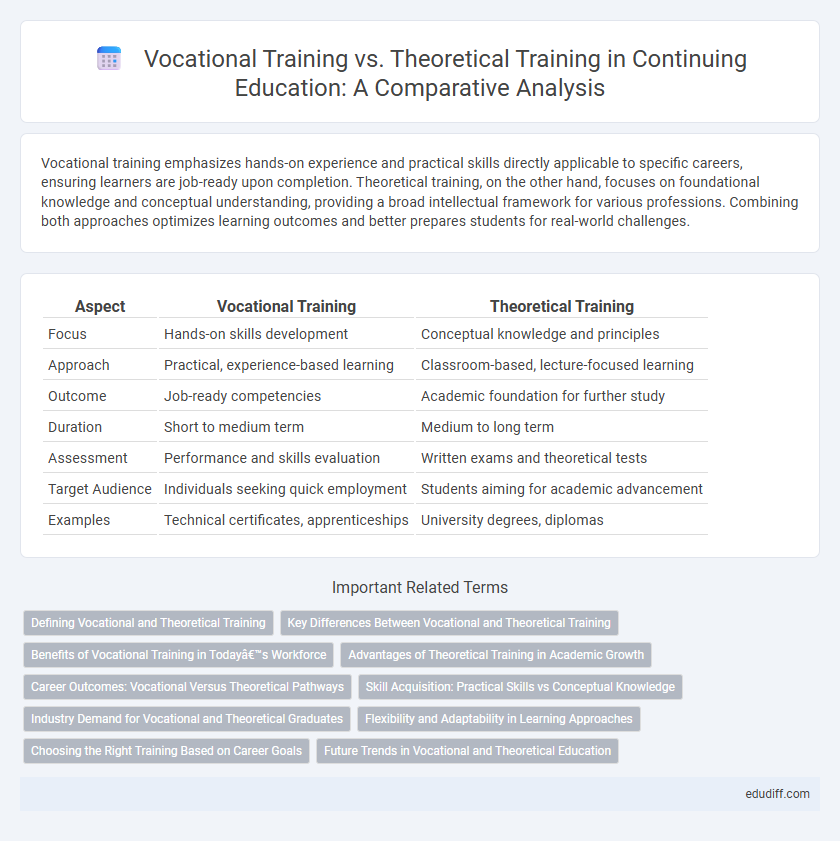Vocational training emphasizes hands-on experience and practical skills directly applicable to specific careers, ensuring learners are job-ready upon completion. Theoretical training, on the other hand, focuses on foundational knowledge and conceptual understanding, providing a broad intellectual framework for various professions. Combining both approaches optimizes learning outcomes and better prepares students for real-world challenges.
Table of Comparison
| Aspect | Vocational Training | Theoretical Training |
|---|---|---|
| Focus | Hands-on skills development | Conceptual knowledge and principles |
| Approach | Practical, experience-based learning | Classroom-based, lecture-focused learning |
| Outcome | Job-ready competencies | Academic foundation for further study |
| Duration | Short to medium term | Medium to long term |
| Assessment | Performance and skills evaluation | Written exams and theoretical tests |
| Target Audience | Individuals seeking quick employment | Students aiming for academic advancement |
| Examples | Technical certificates, apprenticeships | University degrees, diplomas |
Defining Vocational and Theoretical Training
Vocational training emphasizes practical skills and hands-on experience required for specific trades or professions, preparing individuals to perform job-specific tasks effectively. Theoretical training focuses on conceptual understanding and knowledge of principles underlying a subject, providing a foundation for analytical thinking and problem solving. Together, these training types cater to different learning needs, enhancing workforce competence in both practice and theory.
Key Differences Between Vocational and Theoretical Training
Vocational training emphasizes hands-on skills and practical experience directly related to specific trades or professions, whereas theoretical training focuses on conceptual understanding and academic knowledge within a subject area. Vocational programs prioritize real-world applications, apprenticeships, and technical proficiency, while theoretical training involves lectures, research, and critical analysis. The key distinction lies in vocational training's outcome-driven approach for immediate job preparedness versus theoretical training's emphasis on foundational principles and broader intellectual development.
Benefits of Vocational Training in Today’s Workforce
Vocational training equips individuals with practical, job-specific skills that enhance employability and meet the immediate demands of modern industries such as healthcare, technology, and manufacturing. This hands-on approach accelerates workforce readiness, reduces training costs for employers, and fosters higher job retention rates compared to theoretical training. Emphasizing skill proficiency, vocational education aligns with labor market needs, driving economic growth and bridging the skills gap in today's competitive job landscape.
Advantages of Theoretical Training in Academic Growth
Theoretical training enhances academic growth by providing a strong foundation in fundamental concepts and principles, enabling students to develop critical thinking and analytical skills. This type of training promotes a deeper understanding of subject matter, facilitating advanced research capabilities and intellectual development. It also prepares learners for further education and academic pursuits, ensuring long-term career versatility and knowledge expansion.
Career Outcomes: Vocational Versus Theoretical Pathways
Vocational training offers hands-on skills directly aligned with specific trades, resulting in faster job placement and higher initial employment rates compared to theoretical training. Theoretical training provides a broad knowledge base, fostering critical thinking and adaptability beneficial for long-term career growth and opportunities in research or management. Career outcomes reveal vocational pathways prioritize immediate workforce entry, while theoretical pathways enhance versatility and advancement in diverse professional fields.
Skill Acquisition: Practical Skills vs Conceptual Knowledge
Vocational training emphasizes skill acquisition through hands-on experience, enabling learners to perform specific tasks confidently in real-world settings. Theoretical training prioritizes conceptual knowledge, providing a deep understanding of principles and frameworks that underpin various disciplines. Combining practical skills and conceptual knowledge enhances overall competency and adaptability in professional environments.
Industry Demand for Vocational and Theoretical Graduates
Industry demand increasingly favors vocational training graduates for their hands-on skills and immediate job readiness, particularly in technical and trade sectors. Theoretical training graduates are valued in research-intensive and strategic roles, where advanced conceptual understanding is critical. Workforce trends reveal a growing gap between practical skill requirements and purely academic knowledge, driving many industries to prioritize vocational expertise for operational efficiency.
Flexibility and Adaptability in Learning Approaches
Vocational training offers greater flexibility by emphasizing practical skills that can be quickly adapted to changing job demands, allowing learners to gain hands-on experience in dynamic work environments. Theoretical training provides foundational knowledge that supports critical thinking and problem-solving but may lack immediate applicability in fast-evolving industries. Combining both approaches enhances adaptability, equipping individuals with a balanced skill set that responds effectively to diverse professional challenges.
Choosing the Right Training Based on Career Goals
Vocational training provides hands-on experience tailored for immediate job readiness in specific trades, making it ideal for careers requiring practical skills such as electricians, plumbers, or culinary arts. Theoretical training emphasizes foundational knowledge and critical thinking, better suited for professions in research, academia, or fields like engineering and medicine where comprehensive understanding guides innovation. Aligning training choice with career aspirations ensures skill development matches industry demands, optimizing employability and long-term professional growth.
Future Trends in Vocational and Theoretical Education
Future trends in vocational training emphasize hands-on technology integration and personalized skill development aligned with labor market demands. Theoretical training increasingly adopts digital platforms and interdisciplinary curricula to foster critical thinking and adaptability in evolving industries. Both approaches are converging through hybrid models combining experiential learning with theoretical foundations to enhance workforce readiness.
Vocational Training vs Theoretical Training Infographic

 edudiff.com
edudiff.com